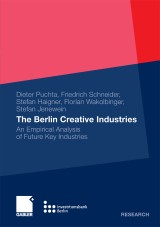Details

The Berlin Creative Industries
An Empirical Analysis of Future Key Industries|
53,49 € |
|
| Verlag: | Gabler |
| Format: | |
| Veröffentl.: | 10.05.2010 |
| ISBN/EAN: | 9783834986511 |
| Sprache: | englisch |
| Anzahl Seiten: | 149 |
Dieses eBook enthält ein Wasserzeichen.
Beschreibungen
The Creative Industries have recently come into the focus of urban development strategies and economic policy. The driving force behind that was, amongst others, Richard Florida with his bestseller “The rise of the creative class and how it’s tra- forming work, leisure, community, and everyday life”. The Creative Industries are increasingly dynamic and growing three times faster than the economy in total. With respect to the economic value added, the Creative In- 1 dustries in Germany are absolutely comparable to the automotive industry. Nonetheless, for entrepreneurs it is often still easier to find financing opportu- ties for property, real estate and assets than for ideas and intangible assets. Thus, - vestitionsbank Berlin has been researching possibilities to finance the Creative Economy since several years. Many who are engaged in spurring the development of cities and regions, h- ever, come across various different definitions of the term “Creative Industries” and several approaches which cannot be exactly distinguished from one another. This might cause confusion.
1.- The Notion of Creative Industries.- On the Theory of Creative Industries.- An International Overview on the Creative Industries.- 2.- From Theory to Empirics.- The Berlin Creative Industries at a Glance.- The Creative Industries in Detail.- Excursus: Differences among Research Results.- 3.- Value Added and Employment.- Conclusions.- 4.- Instruments to Foster the Creative Industries.- Executive Summary.
Prof. Dr. Dieter Puchta is consultant for strategic business development.<br>
Prof. Dr. Friedrich Schneider is Professor of Economics at Johannes Kepler University of Linz. <br>
Dr. Stefan D. Haigner, Mag. Stefan Jenewein und Dr. Florian Wakolbinger are self-employed in applied economic research and lecturers at the Universities of Innsbruck and Linz. <br>
<br>
Prof. Dr. Friedrich Schneider is Professor of Economics at Johannes Kepler University of Linz. <br>
Dr. Stefan D. Haigner, Mag. Stefan Jenewein und Dr. Florian Wakolbinger are self-employed in applied economic research and lecturers at the Universities of Innsbruck and Linz. <br>
<br>
Creative Industries are the key industries of the 21st century and thus an essential element of dynamic metropolitan regions. In Berlin, one in seven enterprises belongs to the Creative Economy. In total, those enterprises yield a turnover of € 7.4 bn and provide more than 80,000 jobs. The authors give a differentiated overview of various approaches towards the Creative Industries and investigate the specific business models and financing needs. The Creative Industries have a heterogeneous structure and a vast fraction of small or micro enterprises. They require creative financing instruments and interdisciplinary approaches in economic policy.
Creative Industries are the key industries of the 21st century and thus an essential element of dynamic metropolitan regions. In Berlin, one in seven enterprises belongs to the Creative Economy. In total, those enterprises yield a turnover of € 7.4 bn and provide more than 80,000 jobs. The authors give a differentiated overview of various approaches towards the Creative Industries and investigate the specific business models and financing needs. The Creative Industries have a heterogeneous structure and a vast fraction of small or micro enterprises. They require creative financing instruments and interdisciplinary approaches in economic policy.


















